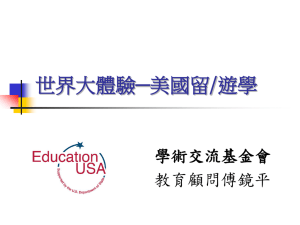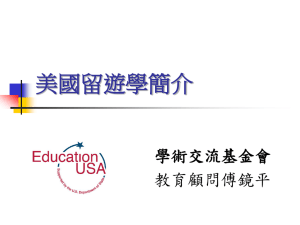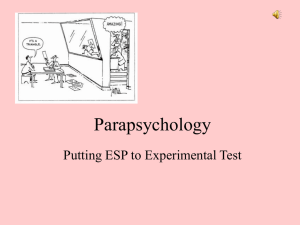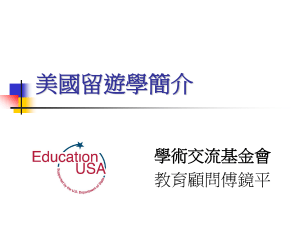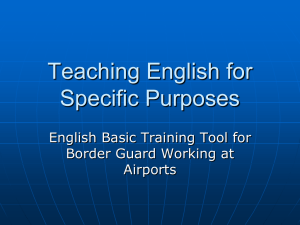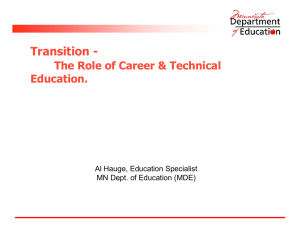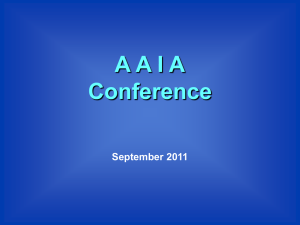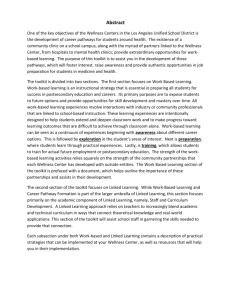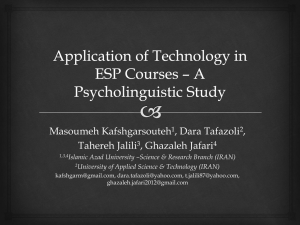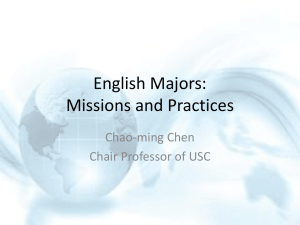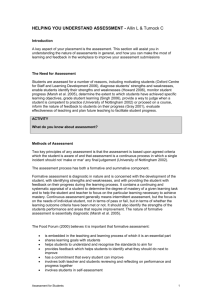Powerpoint - tesol
advertisement
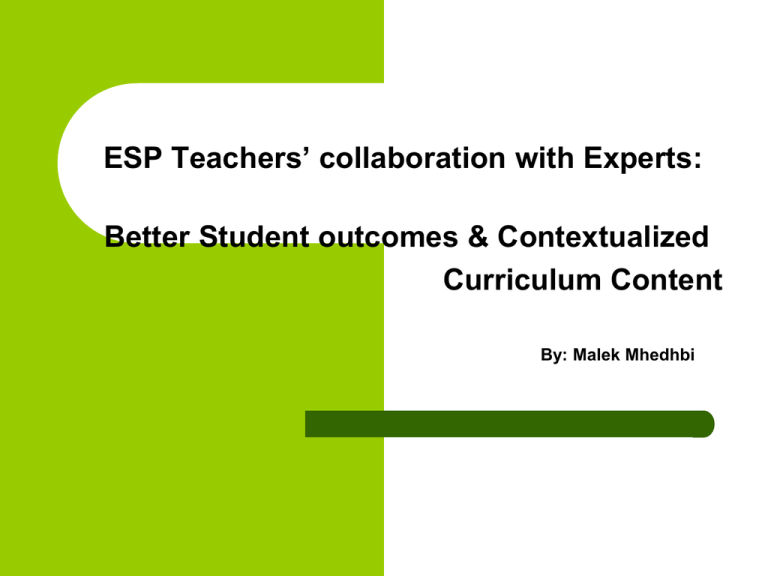
ESP Teachers’ collaboration with Experts: Better Student outcomes & Contextualized Curriculum Content By: Malek Mhedhbi Background 1) ESP & Professional practices The challenge of the interdisciplinary demands and practices of the academy and the world of professions. Recent research in genre analysis favours effective forms of Professional expertise, which integrates specific disciplinary knowledge and professional practice. Teachers’ internship or collaboration with experts: Important role in education especially in career and technical education (Panella, 2007) Needs analysis at the ESP program level A needs analysis should be the fundamental principle on which the ESP approach itself is based. Hutchinson and Waters (1987: 19) ESP teaching must evolve toward more professionalism: Development of specific course-design Competent and reflective teachers Formative evaluation (Daoud,1996) Work-based learning: Teachers’ collaboration with experts “integration of workplace experiences and career and technical education curriculum” Brown (2003: 1). gain an appreciation for the discipline and practice work skills (Brown, 2000). In-depth understanding of the discipline Provides concrete connections between the content, the skills taught in the program and the expectations of the workplace (Reese, 2005) Offers detailed information about the worksite, such as the working operations and expectations of what business English students will do in their careers. Prepares teachers to feel grounded, more confident, and able to foresee challenges and students' questions. Authentic teaching materials Develop a variety of authentic materials for their lessons: workplace videos, employment application, business reports, business newsletters, credit letters, bill of lading… Stimulating learning environment Students’ ability to conceptualize how academic knowledge and skills will be applied in the world of work. (Bennett, et al., 1998) Contextualized curriculum Engaging and relevant activities that meet students’ interests. Planning a variety of innovative activities that engage and motivate students such as: → Integrated reading and writing: comprehend import/export documents & write about document trade procedures. →Demonstration of new vocabulary in swifts or L/C clauses, B/L… →Skimming or scanning contracts, business newsletters… The work-based learning activity Objectives →Mastering business knowledge (Understanding document trade procedure) →Adopting authentic teaching materials (real documents, videos…) Description -Setting: STB (Central Bank) in Mohammed V -Period: December to January, 2012 -Department: Payment & documentation departments -Cooperative business specialists: Rathouane Kliaa (Documentation) Saber Zayani (Payment & Swifts) -Survey tools: Observation & Interview -Teacher responsibilities: get clear explanations with examples about the procedure of trade: from the application of the L/C to the receipt of goods documents. Understand the clauses of the credit letters, advantages of L/C, and different modes of payments & the importance of Bill of Lading Verify the buyer (or company)’ invoice & the L/C to documents receipts from the seller. Benefits Get the direction & guidance from business experts and enhance our knowledge about trade procedure within our context. Give students the basic professional language skills & vocabulary that will serve them later on, in their careers. Improve the course design. An engaging classroom activity Combining teacher-made materials with authentic job-specific ones (the use of commercial documents, figures and videos) to create authentic business contexts. Gap filling exercises: Demonstration of new vocabulary in swifts or L/C clauses, B/L… Writing a paragraph about the role of banks in trade processing based on a problem-solving framework (Introduction, diagnose & brainstorm problem areas, problem statement, supporting details (with realistic illustrations), a concluding sentence & reflect on the advantages/ disadvantages/limitations… Students’ motivation - Work-based learning: supports students-centered learning. → It enriches the classroom experience for students of business English. →It motivates them to accomplish their writings and improve that in pair work through the rewriting activity. Colleagues’ feedback Strengthening collaborative work. Refining the teacher-intern’s plans prior to teaching. Working toward improving the course design making it more specific & making meaningful connections between the skills taught in the program and the expectations of the workplace. Teaching discipline-specific knowledge becomes more thoughtfully and interesting for novice ESP teachers. Integrating authentic teaching resources. Obstacles - Difficulty to get the permission to carry out the survey in the central bank. - Limited time for the work-based learning. Being overloaded with financial information. - - Inability to get access to other business departments within the central bank. Recommendations Administrators should carefully examine how and what professional development opportunities must be provided for their teaching professionals. ESP teachers must collaborate & ensure that their specific-discipline knowledge and skills remain current and relevant in order to adequately prepare students for their careers. It is hoped that such work-based learning activity will be applied for other business units (Logistics, accounting) & in other disciplines (medicine, engineering,airline sectors). Conclusion Work-based leaning is a viable means of providing PD opportunities for specific-discipline teachers. It brings a new perspective to the classroom – the challenges of everyday business life – ESP teachers will be able to create a real-life situation, a variety and meaningful communication to the study of business English. It is a means to grow professionally and expand teaching skills. THANK YOU FOR YOUR ATTENTION
